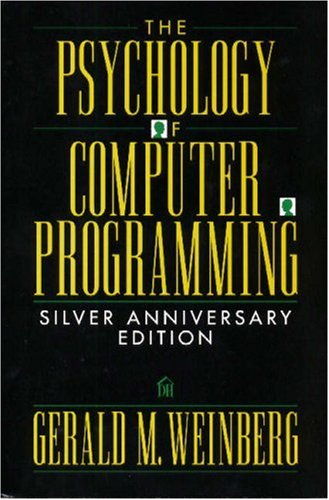Psychology of computer programming epub
Par patton bernice le jeudi, août 11 2016, 02:16 - Lien permanent
Psychology of computer programming. Gerald M. Weinberg

Psychology.of.computer.programming.pdf
ISBN: 0932633420,9780932633422 | 299 pages | 8 Mb

Psychology of computer programming Gerald M. Weinberg
Publisher: Dorset House
Egoless programming's roots lie in the book, “The Psychology of Computer Programming” by Jerry Weinburg, 1971. Jerry Weinberg was the first researcher to look at this stuff in his classic PSYCHOLOGY OF COMPUTER PROGRAMMING. From this, arose the idea of teaching Concepts of programming languages first. I will buy into this congruence buzzword, if this is the same Gerald Weinberg who wrote Psychology of Computer Programming. Gerry was one of the programming gurus of the 70's and his book The Psychology of Computer Programming is based on a system of peer reviews and aims to take the negative aspects of “ego” out of programming. I recently read (sort of) Frederick Brooks's The Mythical Man-Month. John Grinder, a linguistics professor at the University of Santa Cruz, and Richard Bandler, a mathematician, computer programmer and psychology student, received a grant to examine the attributes of excellence. Computer Science is a discipline. As I understand it, this book is a cult classic, and I was very curious to read it. As pedagogy, I would consider it the re-application of Constructivist principles to the learning of Programming Languages and teaching of Computer Science in the age of the Internet. Weinburg describes a style of development environment relying heavily on peer reviews. Gerry Weinberg's Psychology of Computer Programming (1971) opened my mind to the ways in which psychology could be applied to programming. The Psychology of Computer Programming: Silver Anniversary Edition. However, the rules note that the skill should only exist in the more "cinematic" games — in a realistic game, the would-be hacker will have to instead learn a bunch of various skills like computer programming, psychology, etc. If you ever find the time (and know something about programming), I recommend to you the lecture a book from Gerald Weinberg: The Psychology Of Computer Programming. Computational thinking influences fields such as biology, chemistry, linguistics, psychology, economics and statistics.